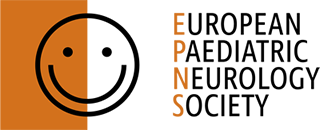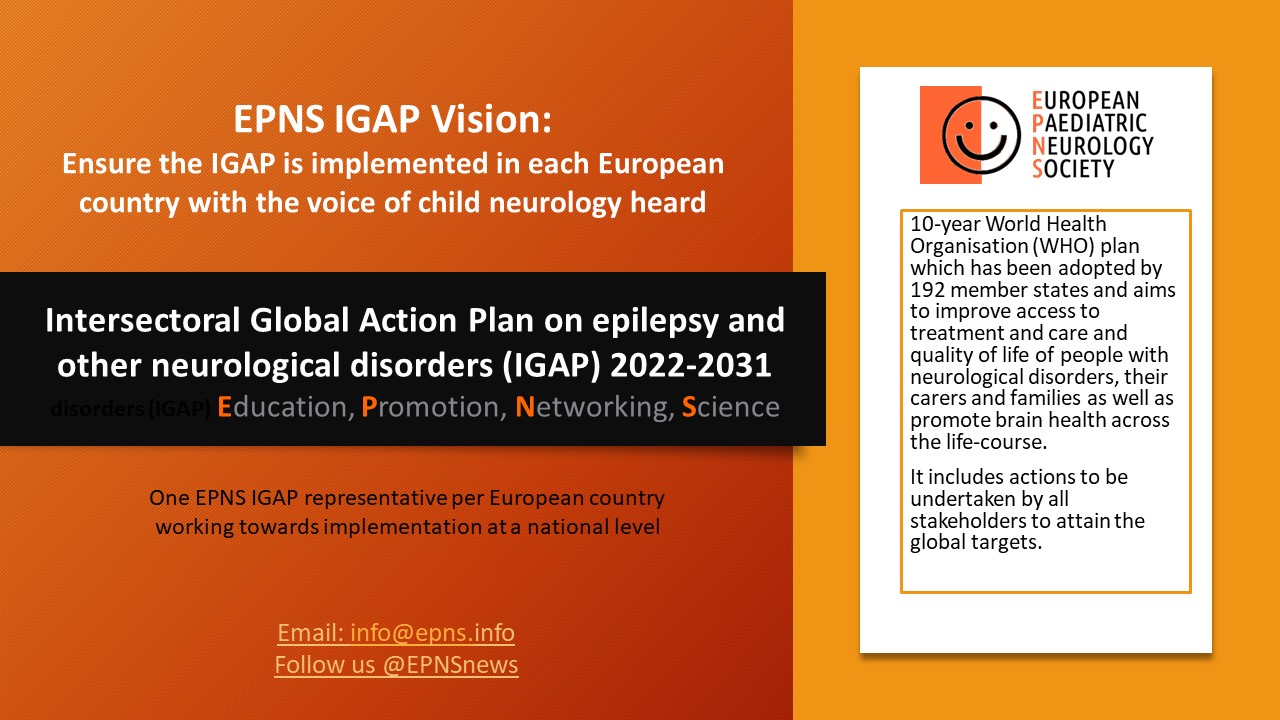Want to learn more about Advocating?
The EPNS has been delighted to offer THREE 1 hour webinars on ADVOCACY TRAINING with a special focus on the field of Child Neurology. The webinars provide insights and practical skills to enhance advocating for the implementation of IGAP at a local and national level. Whether you’re new to advocacy or looking to refine your skills, this series will offer practical, actionable advice and training. View the recordings on the EPNS Moodle today and get ready to enhance your advocacy efforts and join the EPNS on our journey to raise the voice of Child Neurology in your community. CLICK HERE
Intersectoral Global Action Plan on Epilepsy and Other Neurological Disorders (IGAP)
IGAP is a 10-year World Health Organisation (WHO) plan which has been adopted by 192 member states and aims to improve access to treatment and care and quality of life of people with neurological disorders, their carers and families as well as promote brain health across the life-course. It includes actions to be undertaken by all stakeholders to attain the global targets.
IGAP Strategic objectives: there are 5 objectives addressing issues such as policy and governance; effective, timely and responsive diagnosis, treatment, and care; promotion and prevention; research, innovation, and information systems; and a public health response to epilepsy.
Learn more: visit the WHO website: CLICK HERE
EPNS Vision:
Ensure the IGAP is implemented and targets attained in each European country at a national level with the voice of child neurology heard.
EPNS Roadmap:
DATA GATHERING:
January 2024: survey sent to 44 European countries to establish extent of paediatric neurology involvement with national brain councils and national brain plan implementation.
October 2024: survey sent to 44 European countries to to consolidate the situation in Europe and work towards strengthening our IGAP action plan and advocacy voice
FRAMEWORK: February 2024: EPNS IGAP policy framework
AWARENESS:
March 2024: One EPNS IGAP representative in 40 European countries appointed. Representatives invited to a Zoom meeting on 14 March 2024. During the meeting Dr Vanessa Cavallera, Technical Officer and Paediatric Neurologist from the World Health Organisation (WHO), presented an overview of the IGAP plus an introduction on to how to go about implementing at a national level.
September 2024: The 2nd Zoom meeting took place on 26 September 2024 and Wolfgang Grisold, President of the World Federation of Neurology attended as our guest speaker to introduce the WHO IGAP toolkit
Series of 3 Advocacy Training webinars: CLICK HERE
COLLABORATION: communications and engagement with paediatric neurology stakeholders to begin.
SUPPORT: WHO IGAP toolkit to be launched by the end of 2024 and shared with all EPNS IGAP representatives. Continued support to be available from the EPNS and WHO, plus follow-up meetings. Resources available:
- WHO-IGAP-Implementation-Toolkit
- The WHO IGAP Implementation Toolkit: Launch Webinar
- European Federation of Neurological Associations (EFNA)_3 modules taking 22 minutes in total to view
- OneNeurology Health Policy paper editorial
- OneNeurology Health Policy paper
- Executive Summary of Global report on children with developmental disabilities 2023
- Global report on children with developmental disabilities 2023
- Improving access to medicines for neurological disorders
EPNS IGAP representatives:
The IGAP needs to be implemented at a national level. The EPNS thanks and celebrates the involvement of all EPNS IGAP representatives and looks forward to working together to make the EPNS IGAP vision a reality.
| Country | First name | Last name |
| Albania | Artan | Haruni |
| Armenia | ||
| Austria | Rainer | Seidl |
| Azerbaijan | Aytan | Mammadbayli |
| Belgium | Roberta | Cilio |
| Bosnia Herzegovina | Feriha | Catibusic |
| Bulgaria | Ivan | Ivanov |
| Croatia | Nina | Barisic |
| Cyprus | Paola | Nicolaides |
| Czech Republic | Pavel | Kršek |
| Denmark | Maria | Miranda |
| Estonia | Inga | Talvik |
| Finland | Johanna | Uusimaa |
| France | Nadia | Bahi-Buisson |
| Georgia | Sophia | Bakhtadze |
| Germany | Lucia | Gerstl |
| Greece | Stella | Mouskou |
| Hungary | Katalin | Hollody |
| Iceland | Margret | Oskarsdottir |
| Ireland | Mary | O’Regan |
| Israel | Adi | Aran |
| Italy | Raffaele | Falsaperla |
| Kazakhstan | Altynshash | Jaxybayeva |
| Kyrgyzstan | ||
| Latvia | Mikus | Diriks |
| Lithuania | ||
| Macedonia | Olga | Jotovska |
| Moldova | Svetlana | Hadjiu |
| Netherlands | Deborah | Sival |
| Norway | Espen | Lien |
| Poland | Maria | Mazurkiewicz- Bełdzińska |
| Portugal | Monica | Vasconcelos |
| Romania | Cristina | Pomeran |
| Russia | Valery | Zykov |
| Serbia | Jasna | Jancic |
| Slovakia | Miriam | Kolnikova |
| Slovenia | Natalija | Krajnc |
| Spain | Rocio | Sánchez-Carpintero Abad |
| Sweden | Ronny | Wickstrom |
| Switzerland | Annette | Hackenberg |
| Turkey | Dilek | Yalnizoglu |
| Ukraine | Alla | Nechay |
| United Kingdom | Anne-Marie | Childs |
| Uzbekistan | Shaanvar | Shamansukov |

